The lasting cultural impact of Elvis can't be underestimated. In Roland Emmerich's 1998 remake of Godzilla, Jean Reno, playing a French intelligent agent, gets through a US security barrier by saying the classic line "thang-you very much!", and in Men in Black, when the cvar is speeding upside-down through a tunnel to the accompaniment of Elvis singing Promised Land, Tommy Lee Jones' character remarks to Will Smith's that "Elvis didin't die, he just went home". My favourite, though, is in the film of John Grisham's novel The Firm. In the book, main character Mitchell McDeere, in fleeing, hitches a ride with a lorry-driver who is an Elvis impersonator; whereas in the firm we see Tom Cruise, playing the part, in the passenger's seat beside a driver who looks just like Elvis - a nod, no doubt, to the enduring rumours that Elvis is
 alive.
alive.I remember when he died in 1977 because my Mum, a huge fan, came into my room weeping to tell me the news. She'd been hooked since she'd first heard one of his singles on Radio Luxembourg - which, by chance, was the first European station to announce his death. She related to me how the only of his songs she couldn't listen to was Teddy Bear, because when she was a young
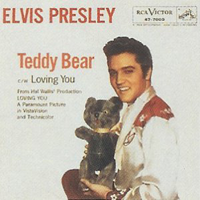 woman with TB in Mearnskirk Hospital near Glasgow, a wardmate had played it continuously on a wind-up record-player until, to the guilty relief of all those around her, the object of her infatuation decided to call things off in a letter.
woman with TB in Mearnskirk Hospital near Glasgow, a wardmate had played it continuously on a wind-up record-player until, to the guilty relief of all those around her, the object of her infatuation decided to call things off in a letter.I think two things in particular attracted Mum and her peers to Elvis. Firstly, living in poverty in Tupelo, Mississippi before moving to Tennessee's Memphis, he was a true working-class hero long before John Lennon coined the term in song while living in the lap of luxury, and - again unlike Lennon - he never forgot where he came from.
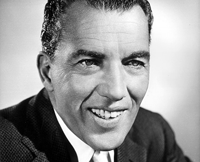 Secondly, his performances exuded sexuality in a "safe" way that was not only due to his distance from Scotland. The Southern laws of deference and politeness that his generation were instructed to observe almost religiously led Ed Sullivan to extemporise a paean to his decency, telling the audience at a time when Presley w
Secondly, his performances exuded sexuality in a "safe" way that was not only due to his distance from Scotland. The Southern laws of deference and politeness that his generation were instructed to observe almost religiously led Ed Sullivan to extemporise a paean to his decency, telling the audience at a time when Presley w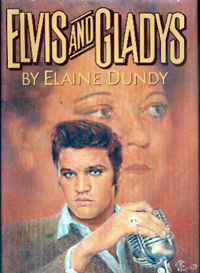 as being attacked with all the might of the Establishment machine that he was "a fine, decent boy" and called everybody "Sir".
as being attacked with all the might of the Establishment machine that he was "a fine, decent boy" and called everybody "Sir".Another side of "Elvis the Pelvis" was a fierce love for his mother, something well understood in Celtic countries, so the rumour being disseminated in the late 1950's that he had killed her must have really hurt. The late Elaine Dundy, who wrote a book on this relationship called Elvis and Gladys, captured the more extreme devotion that still surrounds the star:
Here and now I feel sure that in the next millennium, excavations on the site of what was once Memphis, Tennessee, will uncover artifacts which lead archeologists to conclude there was once a god called Elvis who resided in the sacred temple "Graceland" where his followers gathered twice every year to worship: on the day of his birth, and on the day of his death.Elvis popularised a "black" style of music because of the musicians he jammed with and, like them, had long(ish) hair that migrated into the "duck's tail" (to give it a more polite name) hairstyle that was sported by, for example, Chuck Berry; unlike his black co-musicians, his hair was longer because he couldn't afford to get it cut so often. So, unlike singers of sanitized pop that were being given airtime with Establishment blessings, when he burst onto the scene he was rough and ready to rock, popularising real rhythm'n'blues that let black performers start to take their rightful place in mainstream music on his coat-tails.
His ancestry was patchwork - Scottish, Irish, French, Jewish - and Native American (Cherokee ) - the latter perhaps informing his perfromance as a half-Kiowa frontiersma
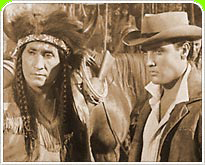 n in Flaming Star, which was remarkably free of melting-pot fuzziness right up to its bleak conclusion. Like George Harrison, Van Morrison and Beverley Knight - andf arguably the majority of artists - he was haunted by a need to pursue a more numinous reality than that which informed his life as a touring and recording artist, dogged by the necessity of feeding the financial appetites of Colonel Parker, both who manipulated him and suppressed many of his talents in favour of what printed money.
n in Flaming Star, which was remarkably free of melting-pot fuzziness right up to its bleak conclusion. Like George Harrison, Van Morrison and Beverley Knight - andf arguably the majority of artists - he was haunted by a need to pursue a more numinous reality than that which informed his life as a touring and recording artist, dogged by the necessity of feeding the financial appetites of Colonel Parker, both who manipulated him and suppressed many of his talents in favour of what printed money.As Elaine Dundy said, "prior to '77...it was possible to get through a day without hearing Elvis' name". At this time of year - and particularly this year, when had he lived he'd have turned 75, sometimes it seems that one hears little else. And, given the incredible generosity of this phenomenal man who gave joy to millions, that's fine with me.
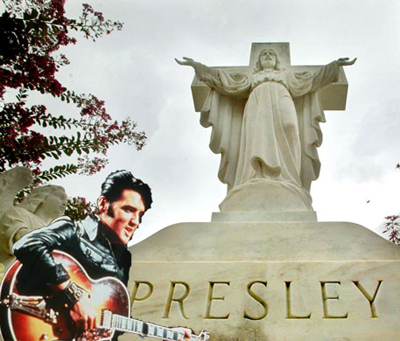











No comments:
Post a Comment
Please feel free to leave a comment - Frugal Dougal.